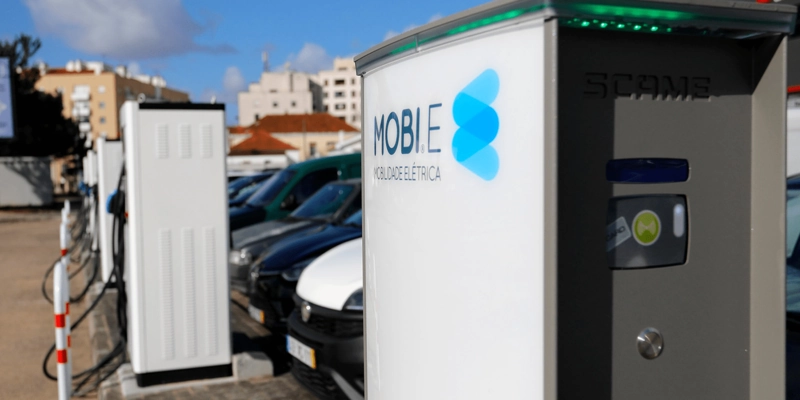Portugal’s leadership in the transition to electric mobility, far from being a surprise, is due to a series of factors that have driven its growth in the sector.
From government policies to actors committed to this change, which allow it to advance significantly compared to other European countries.
In July 2024, the market share of electrified vehicles reached 25.60 per cent with 8,106 units registered, with 15.45 per cent corresponding to 100 per cent electric (4,944) and 10.15 per cent (3,162) to plug-in hybrids.
According to the Association of Electric Vehicle Users (UVE), this increase is not limited to passenger cars, but covers a wide range of categories.
Imported used cars also set a monthly record, with 2,153 registrations, demonstrating growing consumer interest in more sustainable mobility options.
Sales have shown an upward trend throughout the year.
The first half of the year saw a 10 per cent growth compared to 2023.
By mid-year, almost the same number of electric vehicles had already been sold as in all of 2022.
“If this trend continues, it is possible that 45,000 or even 50,000 units will be sold by the end of 2024,” says UVE.
How is the charging network progressing in Portugal?
A key factor in Portugal’s success is the expansion of infrastructure.
The country has broken its own records by installing more than 5,000 publicly accessible charging stations by the end of July.
Users have around 1,900 fast or ultra-fast charging stations at their disposal, representing 37 per cent of the total network.
According to MOBI.E, the public company in charge of promoting electric mobility in Portugal, the number of recharges on the network exceeded half a million in the seventh month of 2023, with an increase of 12 per cent compared to June.
Compared to the same month in 2023, growth is 65 per cent.
Record levels were also reached in energy consumption, which exceeded 11,640,000 kilowatt hours (kWh), marking an increase of 80 per cent compared to July 2023, as well as in the number of users, which exceeded 90,000.
In the first seven months of 2024, more than 3,276,000 recharges were made on the MOBI.E network, which implies an increase of 67 per cent in both indicators compared to the same period of the previous year.
Despite this milestone, UVE warns that “it will be necessary to increase the pace of installation and connection of points, so that the different networks are increasingly available to electric vehicle users.”
In this context, MOBI.E has just launched an international competition for the installation and operation of a total of 156 “refuelling” stations for electric cars.
These will be located in 62 municipalities, selected within the scope of the first phase of the “Electric Streets” project.
The initiative has a budget of 2 million euros, which has been practically exhausted in this initial stage.
The aim is to equip urban areas with chargers, especially in areas where residential or commercial buildings predominate and do not have their own parking.
A total of 66 lots are being put out to tender, each with between two and six supply stations, which will be installed on the same street.
Each station will have a power of 22 kilowatts (kW), with two power outlets, and must accept an electronic payment method.
CPO proposals must be submitted through the acinGov public procurement platform by 11 September.
The locations are expected to be operational by the end of 2025.
Government incentives and support
Apart from tenders, support from the Portuguese government is also an important driver in the transition towards electric mobility.
For the purchase of electric vehicles, a full exemption from car tax is granted.
In the case of plug-in hybrids, a 75 per cent tax reduction applies, provided that the car has a range in fully electric mode of at least 50 kilometres and CO2 emissions of less than 50 g/km.
Hybrids also benefit from a 40 per cent reduction if their electric range exceeds 50 km and their CO2 levels are 50 g/km or less.
In terms of ownership, 100 per cent electric vehicles are tax exempt.
For company cars, an exemption from stand-alone corporation tax applies for zero-emission cars and a reduction for plug-in hybrids that meet the above criteria.
In addition, a 100 per cent VAT deduction is allowed for the former with a price of up to 62,500 euros plus VAT and for the latter with a price of up to 50,000 euros plus VAT.
Private users can receive a subsidy of 3,000 euros for the purchase of a new electric vehicle, provided that the purchase price does not exceed 62,500 euros, although this incentive is limited to one vehicle per person.
No specific incentives are offered for the deployment of charging points.

It is worth mentioning that in 2023, the Portuguese Environmental Fund has allocated ten million euros for the acquisition of zero-emission cars, in addition to incentivizing the scrapping of cars from before 2007.
However, in 2024, the funds available for these incentives have been limited due to changes in government priorities.
Manuel Reis, Vice President of the Board of Directors of UVE, tells Mobility Portal España:
“There is a budget set aside in the Fund that could be used for this, so it is just a matter of political will to implement it.”
Challenges of the Portuguese eMobility market
One of the main challenges facing the country is maintaining the proportion of charging points in relation to the number of electric cars in circulation.
“With this explosive growth, we are now seeing a certain degradation in the number of public chargers,” says Reis.
Problems related to power supply and administrative procedures have caused delays in the entry into service of some chargers.
Despite this, Portugal continues to be positioned above the objectives established by the European Alternative Fuels Infrastructure Regulation (AFIR).
What can companies do to stand out in Portugal?

According to Carlos Ferraz, eMobility Director at PRIO, the main factor to consider is Portuguese legislation and the electric mobility model implemented in the country.
“Portugal is, today, one of the European countries with the highest penetration of electrified vehicles and one of the countries with the greatest maturity in this market,” he assures Mobility Portal España.
However, he points out that the business model is different from the rest of Europe.
“Interoperability is mandatory for all CPOs, giving the user the possibility of using the entire public charging network with a single means of access,” he explains in this regard.
In this way, operators do not interact directly with the end user, but their business model is based on charging a fee for the availability of the equipment.
As regards the figure of the EMSP, this does not exist in Portugal, but the role of the CEME is present, which is similar in all aspects to that one.
The main difference is that CEMEs are also responsible for supplying energy to users, using the CPO infrastructure for this purpose.
This network, managed by MOBI.E, allows different players to select the market segment in which they wish to position themselves, whether in all of them or in a specific one.
This model makes it easier for small businesses to compete on equal terms with large corporations.
In addition to managing the flow of information between the various actors (CPO, CEME, distribution network operators), MOBI.E is also responsible for approving the chargers available to users.
“Manufacturers who want to invest in this market should take this into account,” says Ferraz.
Not only that.
Despite being small, the PRIO representative says that the Portuguese market is also attractive for vehicle manufacturers.








